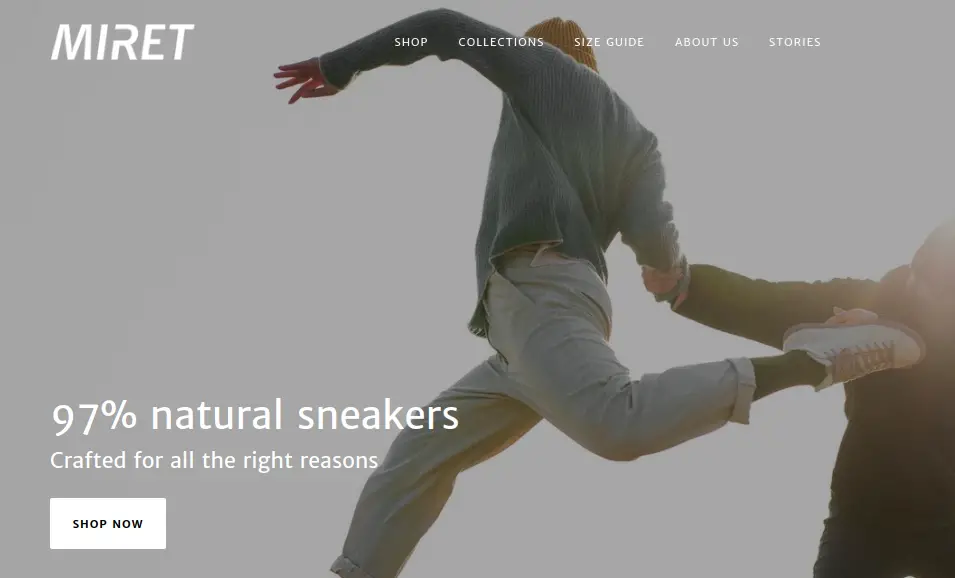As Poslovni Dnevnik/Ana Blaskovic writes, caring for the environment is the latest big deal for the corporate world, but while for many it is just a good PR story and little else, this philosophy has been well and truly lived and breathed by the Croatian startup Miret since day one. The entrepreneurial project of producing tennis shoes without a negative impact on the environment was conceived by two brothers, Domagoj and Hrvoje Boljar.
“This project is a kind of homage to our father who had the Mr. Joseph shoe factory in the 1990s,” says Domagoj, a bachelor of business economics. With his brother, an industrial designer, he wanted to continue in the shoe business, but then came the crisis of 2008 and their business, like so many others, simply began to sink.
Meanwhile, their father fell ill and several years encompassed by hard business struggles followed. At that time, they launched the Jots brand, under which they launched ”crossover” trainers, a combination of classic footwear and sport trainers for the first time on the market.
This put them in the focus of well-known luxury brands such as Krisvanassche, Paco Rabanne, ETQ, Lemaire, for which they designed and developed products and honed their knowledge. After all the ups and downs, the crisis and lack of capital prevailed and the Mr. Joseph shoe factory was sadly forced put the key in the lock.
In parallel with the struggle for the family business to keep its head above water, the idea of Miret was born. ”One day I walked into my brother’s office while reading an interview with French industrial designer Philippe Starck in which he stated that everything he did in his life was rubbish because he contributed to the wave of consumerism with all the negative consequences,” he recalls.
Back then, much like today in some sectors, not much thought was given to sustainable business, microplastics, ocean and sea pollution, and the footwear industry was completely blind to its huge negative impact on the planet.
“Hrvoje said he wanted to go the other way and that’s how the idea of developing trainers that would be compatible with nature came about,” he says.
The first nature-neutral trainer was made from hemp back in 2016, serving as a test of whether there might be any interest out on the market for such a product. This was followed by a painstaking search for suppliers of eco-raw materials to replace the standard ones, and today, Miret is cooperating with 16 suppliers from nine EU countries. It offers a high and low trainer made of 97 percent natural materials, mostly made of plants and not leather due to the way Miret tennis shoes are processed.
One model is completely vegan – it includes absolutely nothing of animal origin. For example, the interior is made of hemp because it breathes and is odor resistant. The ergonomic insole is made of bacterial resistant cork, the laces are made of eucalyptus, the reinforcement is made from corn…
“All of the raw materials we use for Miret tennis shoes must meet environmental and technological standards, be sustainable and aesthetically acceptable. Ultimately, ecology is the basis of all decisions for development and production, but the only thing that can bring long-term change to the environment is the market,” says Domagoj Boljar.
Things changed for the better around 2018; the market had matured a bit by then, there had been talk of sustainable business, problems with plastics, Greta Thurnberg had appeared, and here in the Republic of Croatia, the blossoming startup ecosystem had gained more concrete outlines.
“The first support we received came in the form of 15,000 euros through the Climate-KIC Accelerator, which was implemented by Zagreb’s Zicer, and since then our story has been positively rolling along,” says Domagoj Boljar. Miret then secured a pre-seed investment of 50,000 euros.
After the initial capital role, Miret raised another 70,000 US dollars in their kickstarter campaign, 30,000 euros in the third phase of the Climate-KIC Accelerator, and in September last year, Fil Rouge injected another 250,000 euros.
New markets
The Croatian startup ecosystem has been completed this year, he adds. “The proper preconditions have been created and incredible things have been happening, after Nanobit, Infobip, Infinum and Rimac, it can be said that Croatia had its ”Skype moment” as Estonia had not long before it. There will be some great acceleration, great opportunities are opening up here,” points out Boljar, and as one of the most significant of those things, he mentions the change in the mindset which is of paramount importance.
The business philosophy of the Boljar brothers and their Miret tennis shoes includes direct communication with their customers and consumers, without intermediaries and additional margins, and their base is online shopping. Although they have targeted Europe for ease of logistics and returns, environmentally conscious customers in the US, Japan and Australia are walking around with Croatian Miret tennis shoes on their feet.
”We want to be tied to the company in the long run. We have accepted the investment game, we’re aware that in the next five years there will probably be an exit of investors. It is important to us that the vision, mission and values of a holistic approach of minimal environmental impact remain cemented,” Boljar says of the next five years.
As is the case with electric cars, more and more brands from the footwear industry recognise (and respect) environmental issues, and Miret sees them partly as a competition and partly as comrades.
“If we want solutions to become mass solutions, then products must not become a luxury, there must be no green premiums, that’s the only way we can change things,” says Domagoj Boljar.
For more, follow Made in Croatia.









